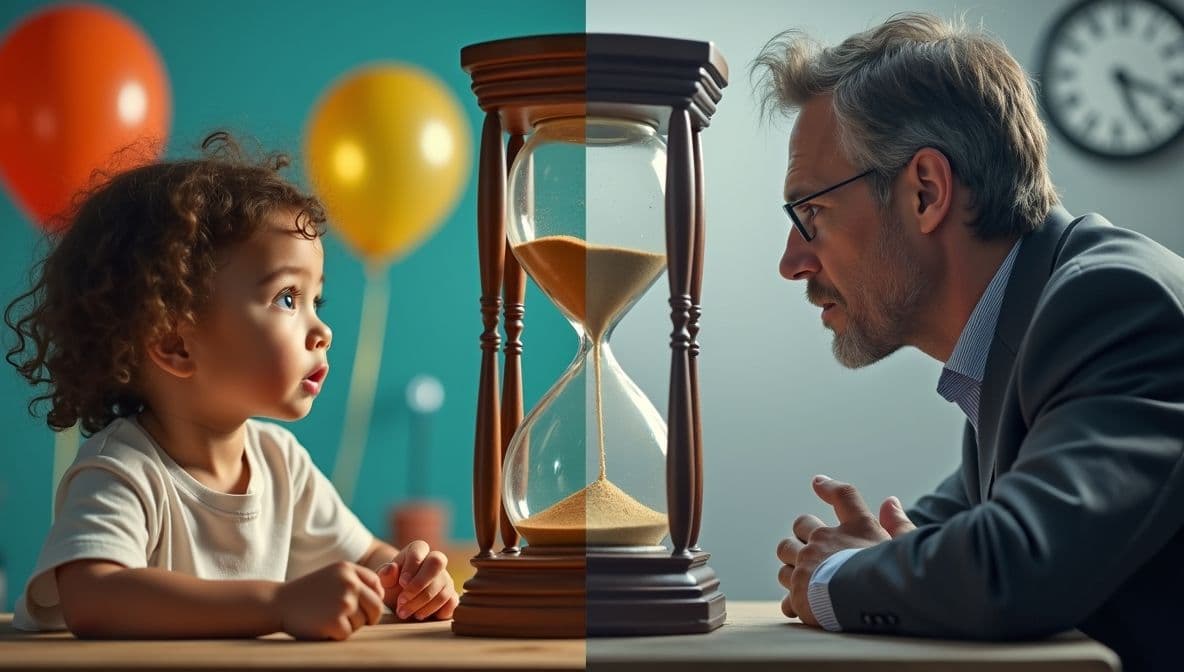Why Time Feels Faster as We Grow Older: The Psychology of Time Perception

Do you remember those endless summer vacations of childhood? The ones where three months felt like an eternity, where a single day at the beach seemed to stretch on forever, packed with countless adventures? Now think about your last year. Where did it go?
If you've ever wondered why time feels faster as you get older, you're not alone. This nearly universal experience has fascinated psychologists, neuroscientists, and philosophers for generations. The answer lies not in the fabric of time itself, but in the intricate workings of human memory and perception.
The Proportional Theory: Why Years Feel Shorter as We Age
One of the earliest explanations for why time speeds up with age comes from French philosopher Paul Janet in 1897. His proportional theory suggests that a year feels shorter as we age because it represents a smaller fraction of our total life experience. To a five-year-old, one year is 20% of their entire existence—a massive chunk of time. To a fifty-year-old, that same year is merely 2% of their life.
While this mathematical explanation feels intuitively satisfying, it's only part of the puzzle. After all, we don't consciously calculate percentages when experiencing time. Something deeper is happening in our brains.

The Novelty Hypothesis: How Memory Creates Time Perception
Here's where the psychology of time perception gets fascinating. Our brains don't record time like a video camera, faithfully capturing every second. Instead, memory works more like a photo album, taking snapshots of experiences—particularly novel, emotional, or significant ones.
Why Childhood Summers Felt Longer
When you're a child, almost everything is novel. Your first day of school, learning to ride a bike, tasting ice cream for the first time, exploring a new playground—these experiences demand your brain's full attention. Your mind is constantly processing new information, forming new neural pathways, and creating rich, detailed memories.
This abundance of vivid memories makes childhood feel longer in retrospect. It's the psychological equivalent of a book with tiny print and hundreds of pages—there's simply more content to flip through.

Why Adult Life Feels Like It's Speeding Up: The Routine Effect
Fast forward to adulthood, and something changes. You drive the same route to work every day. Your morning coffee routine is identical. Weekends blur together. You've seen enough sunsets, eaten enough meals, and attended enough meetings that your brain begins to compress these familiar experiences.
How Routines Make Time Disappear
When experiences are routine, your brain essentially goes into energy-saving mode. Why waste precious cognitive resources encoding every detail of your hundredth morning commute? This efficiency is brilliant for survival but terrible for our perception of time passing.
The result? Fewer distinct memories are formed. When you try to remember the past year, you find large gaps where routine days blended together. Without memory markers to fill that space, time feels like it evaporated.
The Holiday Paradox: Why New Experiences Slow Down Time
This theory explains a curious phenomenon: the holiday paradox. A week-long vacation to a new city can feel longer while you're experiencing it and even longer when you look back on it. Why? Because you're flooding your brain with novelty again—new sights, sounds, tastes, and experiences.
Each unique moment creates a memory bookmark. When you mentally flip through that week, you find it packed with distinct memories: the cafe where you had breakfast, the wrong turn that led to a hidden garden, the sunset from that specific viewpoint. Time feels abundant again because memory is abundant.

How Attention Affects Time Perception in Real-Time
There's another layer to this mystery: how we experience time in the present moment, not just in retrospect. Research shows that our perception of time is intimately linked to attention.
When you're deeply engaged in something—a conversation, a creative project, a challenging game—time seems to fly because your attention is fully absorbed. Conversely, when you're bored or watching the clock, time crawls because you're hyper-aware of its passage.
Children naturally live in a state of heightened attention. They notice everything: the pattern of cracks in the sidewalk, the shape of clouds, the sound of leaves rustling. Adults, stressed and distracted, often move through life on autopilot, their attention scattered across worries, plans, and screens.

The Biological Clock Theory: Does Metabolism Affect Time Perception?
Some researchers have proposed biological explanations for why time feels faster as we age. As we get older, our metabolic rate and heart rate typically slow down. Some scientists hypothesize that we experience time relative to these internal biological rhythms. A child's faster metabolism might create more mental "frames per second," making time feel slower and more detailed.
While this remains debated in neuroscience circles, it adds an intriguing dimension: perhaps time perception is partially encoded in our very physiology.
How to Slow Down Time: Science-Backed Strategies
The good news? Understanding how time perception works gives us tools to manipulate our experience of time. Here are strategies backed by psychology research:
1. Seek Novelty Regularly
You don't need a trip to Bali to make time feel slower. Take a different route home, try a new recipe, visit a museum you've never been to, or learn a skill that challenges you. Each novel experience creates memory landmarks that stretch subjective time.
2. Practice Mindfulness and Present-Moment Awareness
Being present and attentive to the current moment—really noticing the taste of your food, the sensation of breathing, the details of your surroundings—enriches memory encoding and makes time feel more substantial.
3. Break Routines Intentionally
Vary your habits even in small ways. Have breakfast in a different room. Work from a cafe instead of home. These minor disruptions signal your brain to pay attention and create more memorable moments.
4. Create Meaningful Experiences
Emotional intensity enhances memory formation. Experiences that make you feel something—joy, awe, connection—stand out in memory and slow down perceived time.
5. Reduce Autopilot Mode
Our phones and constant distractions can make entire days vanish into a blur. Being intentional about technology use helps you stay engaged with actual experiences and prevents time from speeding by unnoticed.
The Gift Hidden in Time's Acceleration
There's something profound in understanding that time's acceleration is a feature of memory, not a bug of reality. Each moment is still exactly one second long. What changes is how we encode and retrieve those moments.

Taking Control of Your Time Perception
This realization carries both urgency and opportunity. The feeling that time is speeding up is a gentle reminder from your brain: you're not creating enough memorable moments. Your life is becoming too routine, too predictable, too much of the same.
But within that warning lies a beautiful truth: you have more control over your experience of time than you might think. By choosing novelty, attention, and presence, you can expand your subjective experience of life—not by adding more years, but by adding more life to your years.
Those childhood summers weren't actually longer. They just held more moments worth remembering. And nothing stops you from creating that richness again, right now, at any age.
Conclusion: Making Every Moment Count
The clock keeps ticking at the same pace it always has. But the life you experience? That's still yours to design. Understanding why time feels faster as we grow older isn't just fascinating psychology—it's an invitation to live more intentionally, seek more novelty, and create more memories worth keeping.
By applying these insights about time perception and aging, you can reclaim the richness of experience that made childhood feel so expansive. The secret isn't in stopping time, but in filling it with moments that matter.
Related Articles:
- The Science of Memory Formation and Recall
- Mindfulness Techniques to Enhance Daily Life
- How to Break Out of Routine and Find Novelty
- The Psychology of Attention and Focus
Related Posts
 Leveling Up Life: How Gaming Builds Real-World Success
Leveling Up Life: How Gaming Builds Real-World SuccessOctober 28, 2025
 What Happens When You Treat Your Life Like a Gym Workout
What Happens When You Treat Your Life Like a Gym WorkoutOctober 28, 2025
 Why The Next Big Trend Isn’t Digital — It’s Human
Why The Next Big Trend Isn’t Digital — It’s HumanOctober 28, 2025

